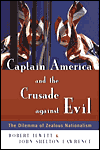

 |

|

The average rating for Captain America and the crusade against evil based on 2 reviews is 4 stars.
Review # 1 was written on 2021-01-20 00:00:00 Chong-ren Chien Chong-ren ChienThis book, even thought it spends many pages analyzing American involvement in Indochina (it was published in 1973, so the Vietnam War is still going on), is somewhat relevant for understanding our American predicament today. Jewett's interpretation of the bible as books comprised by a divided priestly caste that alternated between what he calls " Prophetic realism"(a kind of realpolitik of religious vision) and Zealous Nationalism"(a dogmatic, uncompromising view of good guys vs bad guys where the bad guys are all demonic agents and the good guys are working on behalf of the Lord) was a view that someone like me who lived for decades in Evangelical circles had never before come across; although I did know that Revelation had come out of a very Jewish Apocalyptic tradition that we in the West had no understanding of, and although I did know that the book of Daniel was actually written well after the period in which the main character of the book was supposed to have lived, I didn't understand how the writers of both books were steeped in Zealous Nationalism--or a similar mindset--and so this part of Jewett's thesis was very intriguing to me and actually made quite a bit of sense as far as how these books fit together within a particular tradition and worldview. That these books sit within the same canon with others that take the opposite tack also explains many of the contradictions within said canon. Jewett argues that both of these strands are present in the USA, but that the dominant voice is that of Zealous Nationalism, which tends to create a national psychosis whenever its entertained by those working in political institutions. Jewett also sees Zealous Nationalism as a way that the Puritans saw the world and that this tradition, while tending more towards the secular, still holds great pull in our country. I'm not sure where, but I recently read an article that traced the rise of the religious imagery of the Rapture and Great Tribulation through presidents from Richard Nixon onwards, so yeah, Jewett's argument made sense to me in this respect. Jewett sees the enemy of the Zealous Nationalist as the outsider (immigrant, Native American, Communist countries, etc). While the goal of said nationalist is to restore peace and prosperity, this can only happen through massive bloodletting. The Captain America aspect of Jewett's thesis is that the narrative of the ZN is fueled by conspiracy theories that can only be overcome by righteous, superhuman characters who are fully devoted to the cause of justice; however, these folks will need to operate outside of the rule of law because the rule of law (which would be something hammered out by the Prophetic Realist side) doesn't understand the insidious tenacity of the evildoer. As I read, I began to think more and more that the capacity to hold the ZN view is pretty much within every human being's ability and that it's more or less our natural default mode. Jewett seems to think that Americans are so gullible as to be guilty of following the ZN narrative without having the capacity to see it for what it is--it makes us look really good fighting all of those evildoers and whatnot! I think that the problem with America is that we have, at least following the Civil War and omitting the McCarthy scare, been able to see the evil doer as operating as a foreign country; however, in the age of Trump, the evil doer is anyone who votes for the other side, which is actually a scary thought when you stack up all of the carnage that good old American boys have created in our pursuit of a more freedom-loving world! Now the critique. The book's thesis is based upon a binary, which is simple but always turns out to be a disappointment in that binaries lack the kind of complexity that human society builds. I wish it were as simple as saying that folks need to stop with the Zealous Nationalism narrative and get with the Prophetic Realism one, but things just aren't that simple. Although I thought that Jewett's take on the priestly caste was interesting, I wish that he would have brought in more sources that supported his reading. Speaking of sources, the majority of Jewett's are secondary, which means that he did little archival work but instead relied on the work of others to build his argument. There's nothing wrong with this when you're writing to the masses, I suppose, but I have no idea of Jewett's depth of knowledge of Jewish thought pre and post Second temple period, and I don't know how competent he is in tracing the evolution of American political thought through the centuries. It's a compelling thesis that he's offering, but I fear that any digging will cause it to fall apart rather quickly. I mean, OK, you found a contradiction, but this should be where things start getting interesting, not where you hang your hat. |
Review # 2 was written on 2012-01-27 00:00:00 Michele Martinez Michele MartinezThis book is fascinating for those who are interested in the superhero aesthetic. This examination of American mono-myth is at once both fascinating and eye opening. I recommend this book for those who are interested in examining superheros from an intellectual viewpoint. |
CAN'T FIND WHAT YOU'RE LOOKING FOR? CLICK HERE!!!